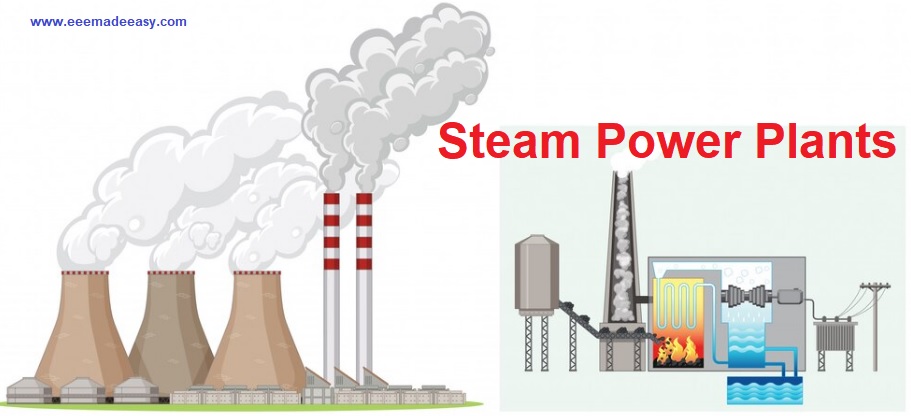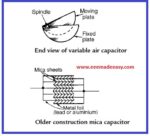Steam power plants:In a steam power plant, steam power is used to rotate the prime mover of electric generator. In this process, heat energy is converted into mechanical energy and then to electrical energy through turbine- generator system.
Heat energy may be obtained by the proper combustion of a commercial fuel (coal, gas, oil etc).
Water is used to generate steam, which readily conveyed through pipes in a boiler by burning fuel in a furnace. Steam power plants are also called ‘thermal power plants’.
The prime movers of steam power plant may be operated either in non-condensing or condensing.
Types of Steam power plants
- Non-condensing plants
- Condensing plants
Non-condensing plants: The steam is exhausted from the prime movers and is discharged at atmospheric pressure or at greater than atmospheric pressure.
Condensing plants:- The prime movers exhaust discharge steam into a condenser in which the pressure is less than atmospheric and steam is converted to water (most common).
-Used in countries, where high-head water is not available for power generation in hydroelectric plants.
The thermal efficiency of the plant depends upon the choice of steam cycle.
References
1 General layout of Steam Power Station|Steam power plant parts
2 Rankine cycle|power Cycle for steam power plants
3 Steam power plants|Steam power generator Plant
Principal components of Steam power plants
- Boiler
- superheating
- feed water heating
- steam reheating
- turbine and
- generator
Read : General layout of Steam Power Station|Steam power plant parts
Rankine cycle|power Cycle for steam power plants
Advantages of Steam power plants
i. The fuel is very cheap.
ii. Less initial cost compared to other generating stations.
iii. It can be installed at any place irrespective of the existence of the coal. Coal can be easily transported to the site.
iv. Require less space compared to hydro electric power plants.
v. Cost of generation is less than diesel power station.
Disadvantages of Steam power plants
i. Pollutes the atmosphere due to the production of large amount of smoke and fumes.
ii. It is costlier in running cost as compared to hydro electric power plant.
Steam power plants can be
- Thermal power plants
- Super thermal power plants. ( ≥ 500MW)
Thermodynamic cycle of steam flow
First law of thermodynamics
This law relates the energy equation in its various forms.
It states that, when a system executes a cyclic process, the algebraic sum of the work transfer is proportional to the algebraic sum of the heat transfer.
Or,
Energy can neither be created nor be destroyed.
Second law of thermodynamics
- Used in dealing with entropy and loss relations.
- It states that,
(1) Heat cannot on its own, flow from a body at lower temperature to a body at higher temperature (Clausius).
(2) It is impossible to construct a heat engine which performs one complete cycle, and delivers work, exchanging heat from a single source (Kelvin-Plank).
Or,
·It is impossible to build a heat engine that has 100% thermal efficiency.
When heat is transferred to water, its enthalpy and physical state change.
As heating takes place, the temperature of water rises and generally its density decreases.
The vapour formed in this process is known as steam, which is a gaseous state, but does not entirely follow the laws of a perfect gas.
The temperature at which boiling or vaporization occurs is dependent upon the purity of water, and the absolute pressure exerted upon it.
The Carnot cycle cannot be applied to the steam turbines as the compression phase does not exist in steam plants.
A steam power plant basically works on the Rankine cycle with small deviations from the ideal Rankine cycle.
References
- General layout of Steam Power Station|Steam power plant parts
- Rankine cycle|power Cycle for steam power plants
- Steam power plants|Steam power generator Plant
- Environment MCQ for RRB JE CBT 2|Objective Questions Environment for Competitive Exams
- RRB JE CBT 2 Computer Awareness Book Arihant|Objective Computer Awareness Book 2025
- RRB JE CBT 2 Exam Date 2025 Postponed|RRB JE CBT 2 Exam Date
- [PDF]RRB JE Result 03/2024 Cut off, Selected no of candidates for all regions
- [PDF]Final Answer Key Junior Instructor Mechanic Agricultural Machinery|643/2023 Solved Question paper
- Acoustics MCQs|Industries Extension officer|IEO 2025
- LASER MCQs| Industries Extension officer|IEO 2025
- Practical Types of Capacitors
- [PDF] Syllabus JUNIOR INSTRUCTOR MECHANIC AGRICULTURAL MACHINERY|643/2023 Syllabus Kerala PSC
- [PDF] Syllabus JUNIOR INSTRUCTOR WOOD WORK TECHNICIAN|674/2023 Syllabus Kerala PSC
- [PDF] Syllabus JUNIOR INSTRUCTOR MECHANIC CONSUMER ELECTRONIC APPLIANCES|670/2023 Syllabus Kerala PSC
- [PDF] Junior Instructor Hospital Housekeeping| 646/2023 syllabus Kerala PSC









